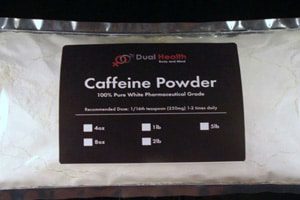
The U.S. Food and Drug Administration (FDA) has seldom used its authority to ban supplements from the market, but some regulatory experts say the agency should implement that power for powdered caffeine, which has been linked to at least two recent deaths. The Dietary Supplement Health and Education Act (DSHEA), which was passed by Congress […]

Will FDA Ban Powdered Caffeine?
The U.S. Food and Drug Administration (FDA) has seldom used its authority to ban supplements from the market, but some regulatory experts say the agency should implement that power for powdered caffeine, which has been linked to at least two recent deaths.
The Dietary Supplement Health and Education Act (DSHEA), which was passed by Congress in 1994, gives the FDA authority to ban supplements that pose health risks. Natural Products Insider reports that United Natural Products Alliance (UNPA) president Loren Israelsen can only recall one situation where the FDA actually did so; in 2004 the agency removed ephedra products from the market after it was linked to heart attack and stroke.
Natural Products Insider reports that in December, the Center for Science in the Public Interest (CSPI) petitioned the FDA to remove pure, powdered caffeine from the market. The ban was advocated by lawmakers who met with the parents of a teen who died due to powdered caffeine overdose.
The FDA stated in an advisory warning that a single teaspoon of pure caffeine is roughly equal to 25 cups of coffee. Pure powdered caffeine can be fatal in small amounts.
In a Jan. 22 letter to FDA Commissioner Margaret Hamburg, six senators wrote “Given that very small amounts of powdered caffeine can cause severe adverse events including death, it is time for the FDA to use its authority to ban the sale and marketing of this dangerous product,” Thomas Kraus, an FDA Official, wrote a March 16 letter to Sen. Richard Blumental stating that “the Agency is committed to addressing this important public health issue and continues to evaluate the complex legal, scientific, and policy issues associated with bulk powdered caffeine products.”
The FDA has opened a docket on the CSPI’s petition. Although the agency is typically given 180 days to act, there is no guarantee that it will move forward. In fact, some petitions filed with the FDA that have been pending for decades, according to a chief regulatory affairs attorney for CSPI. The group urges the FDA to find pure caffeine as a dietary supplement that can lead to “a significant or unreasonable risk of illness or injury under conditions of use suggested or recommended in the labeling,”
“Just as FDA removed ephedra from the market under authority granted by DSHEA, that option is open to FDA,” said Israelsen, according to Natural Products Insider. “I don’t know what they will do. We feel FDA has authority.”


